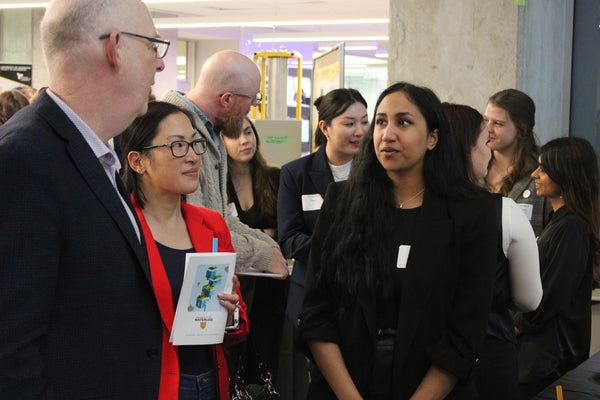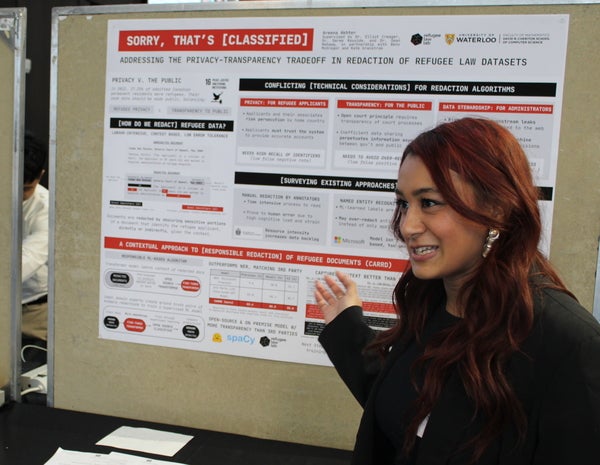On Wednesday, March 27, from 4 to 7 pm, the Faculties of Engineering, Environment, and Mathematics held a joint Interdisciplinary Capstone Design Symposium.
The event featured presentations by teams of students in one of three courses taught all year by Michael Wood (continuing lecturer in Environment & associate dean of work-integrated learning) and Derek Rayside (associate professor of Electrical and Computer Engineering): ENBUS402B, GENE404, SE49, and CS494. The participants included approximately 100 Environment students, 40 Engineering students, and 8 Math students.
The inaugural event represented the culmination of a year of work and collaboration through the IDEAs Clinic, which is “creating opportunities for multidisciplinary and interdisciplinary interaction and collaboration at all levels.” While the student research spanned a variety of topics, many projects were particularly relevant to the Waterloo at 100 goals.

Safi co-founder Miraal Kabir explains her project to Mark Giesbrecht (dean of the Faculty of Mathematics) and Stephanie Whitney (director, research & innovation partnerships)
The capstone project “encourages teams to engage with real-world problems outside the classroom, as a transitional educational experience to the larger scopes and longer timelines (even longer than co-op!) that they can expect to see in their careers!” wrote associate deans Jason Grove (Engineering), Johanna Wandel (Environment) and Cecilia Cotton (Mathematics) in their introduction to the evening’s program.
Three projects highlighted work being done by students from the Faculty of Mathematics. Computer Science and Business student Miraal Kabir spent the year working on the software side of Safi, the burgeoning milk-pasteurization start-up that she co-founded with fellow Math students Martin Turuta and Daria Margarit.
“Our solution so far has been really hardware focused, and we’ve talked about our software aspect for a really long time, but getting to it has always been a challenge,” Kabir says. “I think using the capstone project to push it forward and having the support of the Faculty has been a great opportunity to actually create the software product. Being able to pilot it in a few months is really exciting!”
Computer Science students Charles Liu and Daekun Kim, along with classmates Jonathan Xu (Computer Science) and Ricky Mao (Software Engineering) spent their year working on “EEG to Image Reconstruction” – otherwise known as mind-reading and visualization! During the capstone, one team member sat in a chair wearing a cap connected to electrodes and wires, while the other members explained their project’s potential contributions to medical diagnosis and neurotherapy, brain-computer interfaces, AR/VR integration, and neuroeducation.

Computer Science student Areena Akhter explains her project, "Tensions in Redaction of Refugee Court Files."
Computer Science student Areena Akhter worked on her project, “Tensions in Redaction of Refugee Court Files” as part of a larger collaboration with recent Waterloo graduates Kate Granstrom (Software Engineering ’23) and Benn McGregor (Software Engineering ’23). Her team collaborated with Osgoode Hall Law School’s Refugee Law Lab to develop a machine learning algorithm that could efficiently and accurately redact sensitive or confidential information from refugees’ publicly available legal documents.
Akhter particularly appreciates the perspectives her classmates from other disciplines provided while she was working on the project. The software engineering students, she says, helped her address aspects of her algorithm that weren’t her instinctive focus, and the Environment students “provided a more human-centered and system-centered look at my project. Sometimes you go into the CS stuff so much that you forget about its context.”
Faculty of Math dean Mark Giesbrecht joined the Engineering and Environment deans in congratulating the assembled students for their hard work, collaboration, and commitment to research. “At Waterloo, we love to talk about innovation as an abstract concept,” he said, “but in this capstone symposium we get to see real, concrete examples of that spirit of innovation put into practice.”